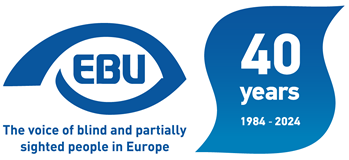Access denied
Back in November 2014, in our “Access denied” report, EBU gave examples of inaccessible products and services which would likely remain inaccessible without comprehensive EU legislation.
These included important everyday devices such as ATM machines, televisions and computers.
http://www.euroblind.org/news/nr/2569
Access designed?
The technology and knowledge exists to remove these barriers. The fact that some ATMs, phones, computers etc, are already accessible proves that point. Most of these devices are still not accessible, however. Unless the law requires their inclusive design, mostly these products will continue to be beyond bounds for blind and partially sighted people.
The EAA to the rescue?
One key piece of legislation we have been calling for to remove these barriers was the so-called “European Accessibility Act” (henceforth EAA in this article) that the Commission had promised back in 2011.
So, in early December 2015, EBU was delighted that the Commission finally tabled the proposed EAA.
The newly-proposed Directive seeks to require that a wide range of goods and services be accessible to disabled people and others with a “functional limitation”.
Improving the internal market, improving accessibility… or both?
The EAA proposal only seeks to harmonise laws in areas where the Commission feels legislation would improve the functioning of the EU's internal market, rather than to rectify discrimination in all areas where there is an inaccessible product or service.
In a sense, this approach fits with the EU's Digital Single Market or “DSM” initiative, which also focuses much effort on improving the EU's market, and is not therefore called something broader, such as “Digital EU for All” or “Single Digital Society”.
This distinction –“market, not society”- matters. Why? Because there are some areas of discrimination that we need “fixed” via EU regulation, but for which there appears to be no case that such legislation would harmonise and therefore improve the functioning of the EU's “market”. In those areas, we have been told, the relevant EU legislation is likely to be the EU's proposed “Equal Treatment Directive” (ETD), and not the EAA. However, the bad news here is that the ETD has been stalled for years due to the opposition of some Member States.
These are tough times to achieve socially-focused legislation in Europe, with austerity being a commonplace, and more “jobs and growth” the EU's overriding objective.
Despite this political context, in the EAA proposal, we do have a great opportunity to make real progress in the right direction.
http://ec.europa.eu/social/main.jsp?langId=en&catId=89&newsId=2400
The EAA proposal
The EAA proposal covers computer hardware and operating systems, ATMs, ticketing machines, check-in machines, phones and smartphones, tablets, TVs, online shopping, banking services, e-books and websites of transport companies, and we welcome all of that.
Despite being pleased that the proposal has been tabled, and welcoming much of its content, we do have some concerns, which we expressed in our initial response to the Commission on the proposal:
http://www.euroblind.org/press-and-publications/publications/nr/46
The scope
There are many products and services which this proposal does not cover and which we feel it could and should include. For just one example, though “ATM” or cash machines are covered, payment terminals that are used by customers with credit cards in shops appear not to be in the scope. We do not understand the logic of that exclusion.
Exceptions to the new rules
The European Commission's proposal foresees exceptions to compliance for companies that believe it is too complicated or too expensive for them to make their product or service accessible. We have asked for clarification of these exceptions and for strong safeguards to be in place to avoid abuse. We do not want a law which ends up being optional for those upon whom it is supposed to make requirements!
We are also keen to better understand some of the wording of the proposed new law. To be fair to the Commission, it is tough to word the EAA so that it requires sufficient accessibility, is “future-proof”, and explains clearly which functions an accessible product or service should achieve. We hope to work with the Commission and other interested parties to strengthen and clarify the wording where necessary.
What now?
We have already met key people from the Commission, Council and Parliament to discuss the EAA draft. We are working on the matter with our friends in the European Disability Forum and ANEC.
We will of course be following and providing comments to the legislative process as this happens, urging a really strong, effective EAA.
We have a lot of work to do, but if we achieve a good EAA, Europe really will have taken a big step towards finally being accessible to blind, partially sighted and other people with disabilities. That is surely a goal worth fighting for.

